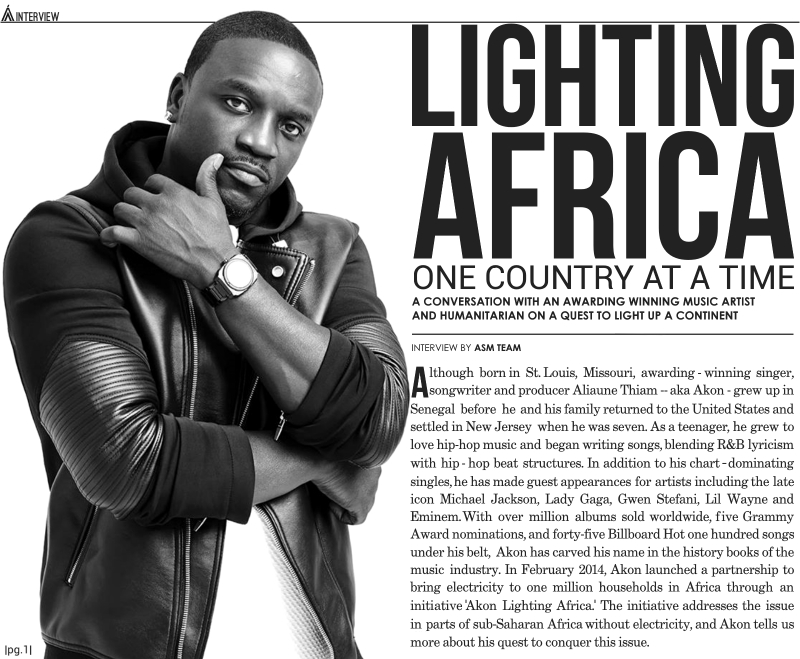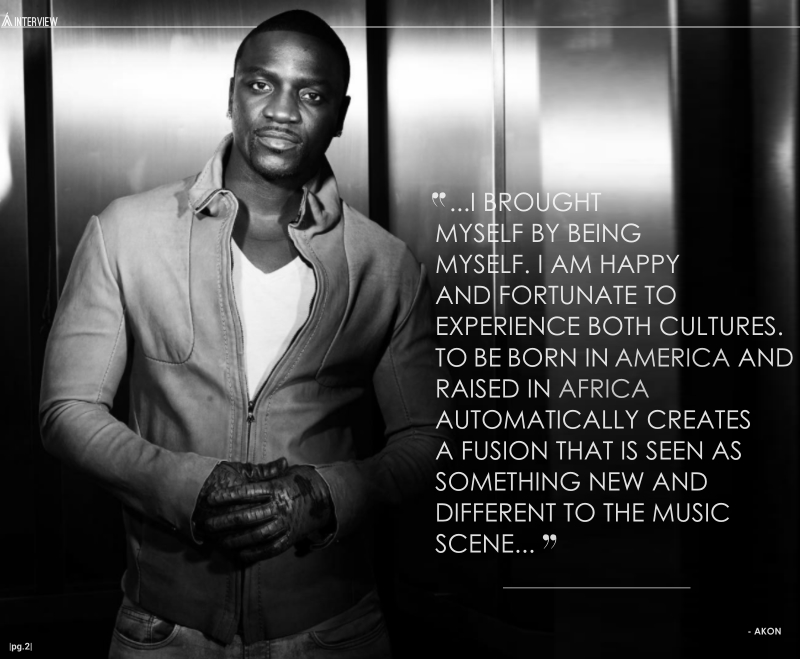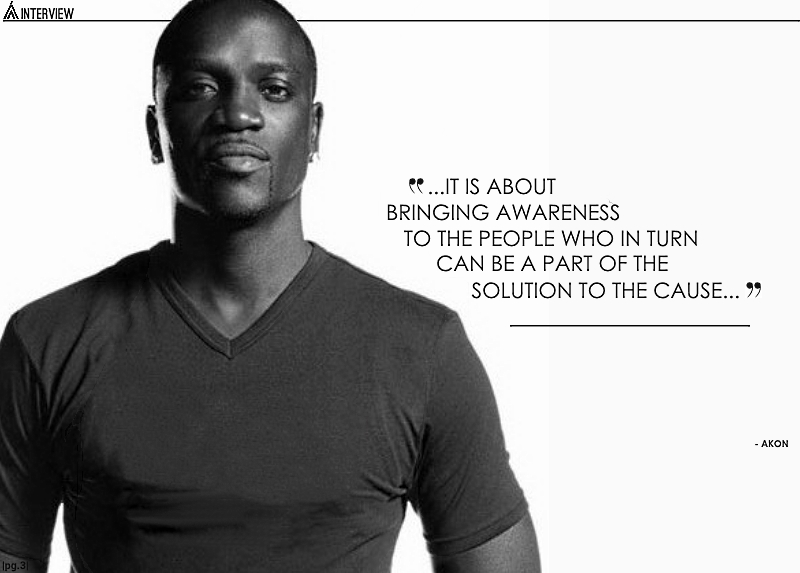



ASM: You grew up in a musical family. At what moment did you know that music will become a part of your life?
AKON: When I was locked up I decided to pursue music. Music was always in my life however, it was not something I wanted to pursue; but it would end up being the path that would change my life. I never thought that there would a moment that I would say, “okay, music is what I want to do.” My dad, Mor Dogo Thiam was a jazz musician and percussionist and so, I was constantly surrounded by Jazz. As versatile as the genre is with the different instruments that people played, I was only exposed to the freestyle Jazz, which I did not understand nor like. It was when I brushed up on my English, got accustomed and fell in love with hip-hop music as I listened to stories of struggles by the hip-hop artists, I was reminded of what I went through coming up from a third world country. It was that connection that drove me to music.
ASM: You mentioned music saved you. Can you tell us when or how this happened?
AKON: I was a stand-offish kid growing up. I had a real rough childhood because I was a foreigner. People made fun of my accent, skin color and I did not have many friends. As I went through these experiences, I wrote about them as songs; or as poetry that later became songs. It became a habit and a part of me. Instead of talking to people about my experiences, I would go into the studio and create a song about them – and this led to a creation of many songs before I got locked up. It was while I was locked up, I wrote the hit song about being locked up. I started thinking about my future because I did not want to be on the same path that got me behind bars - I did not want to live the way I was for the rest of my life. I had to decide on what I wanted to do when I got out knowing there would be limitations for someone like me trying to join the workforce. The option of taking the wrong path and hitting the streets to make the quick money was out of the question, so the only option I saw was to make music. Music became my focus; and that is when I realized that music saved me.
ASM: People say that you bring something different to the table with your style – maybe due to your cultural background as an African. Though you mentioned being connected to the hip-hop genre of music, do you feel you were bringing something different when you began?
AKON: I think I brought myself by being myself. I am happy and fortunate to experience both cultures. To be born in Africa and raised in America, automatically creates a fusion that is seen as something new and different to the music scene. At the same time, I was not inclined to do what everyone else was doing. I always wanted to stand out and not create music that had already been done. Ultimately, I was comfortable in embracing my African culture, melodies and accent in my music - as a whole, I wanted to embrace who I was. Naturally, this fusion created a sound that was different from others. It was the patriotism in my music and sound that helped bring great support from the African continent; in addition to the creativity that got people’s attention domestically.
ASM: Your business also seems to have an interesting fusion. There are people who have a difficult time making that transition from music to business. Was it something you taught about beforehand? Were you a strategist when you started creating your music or are you naturally adaptive? What was your thinking process in starting such a creative business?
AKON: I think it was a mixture of all of it - you know, understanding where creativity got me, being original yet adaptive, but then knowing when to take risks. There is the saying that goes, “the greater the risk, the greater the reward,” and so I felt I did not have anything to lose because I have nowhere else to go but up. I did my homework by researching and asking questions to know more about what I wanted to get into. I saw these new paths as opportunities to go all out and be creative and still get recognized positively for my work rather than putting me away and taking me backwards. In addition, to be honest, I was in a better place in comparison to where I was and I felt that I could take it a step further while being in this better place by creating opportunities that benefit others as well.

ASM: In taking these risks and putting yourself out there, you transitioned into a powerful humanitarianism in a way many people that we are familiar with do not approach. Looking at ‘Akon Lighting Africa,’ can you tell us how you began? Is it something that you thought about all along in giving back to Africa or did it evolve over time as you worked on your music?
AKON: That is one thing I would say was always a plan. I wanted to go back to Africa and help grow the continent. I was trying to figure out how I would accomplish this goal before I was presented with this opportunity through an introduction by my friend John to the solar project in Africa. Our elders are older or have passed away and our people are left in such dire straits with no clean water, food, electricity amongst others. I wanted to be a part of this initiative because I wanted to create an infrastructure that would be highly beneficial with great longevity in caring for the people to get and live a better life. Africa has a lot of resources and so it made sense to go back with the goal to light up Africa starting with the rural areas which in turn expands the grid. That is how the organization was created.
ASM: You mentioned caring for the basic needs of the people which are fundamental for a better life. Can you tell us some of the basic needs that are satisfied and some of the real material day to day changes that occur when your light up an area? Is there a way of integrating local engineers and teaching people about the electrical and solar industry?
AKON: The impact that we got from installing street lights through solar electric power was extremely positive. We added solar powered water pumps, which means people have access to clean water that they never had before. The basic things that many take for granted is appreciated in the areas. The ability to read at night or access clean water to cook is a gift to many. They do not have to worry about the charcoal or kerosene that aid in air pollution which is unhealthy. Also, we wanted these efforts to also be a way to encourage those seriously interested in building a career in this field so they carry the torch in helping more communities by granting school scholarships in this field, creating workshops that teach how to safely install them; in addition to other ideas we are considering. These opportunities lead to an economic growth which our communities really need.
ASM: That brings us to the next question. We noticed you chose the traditional industrial model in presenting ‘Akon Lighting Africa.’ It is not the usual non-profit organization’s process of donating for charity. What was your reason process in that?
AKON: Well, charity donations do not work in Africa. It does not matter the number of times billions of monies are given to Africa, there is still not much done. Yes, there is the appreciation when the money is given, however, the expectation will be to give more and more with no strong and permanent resolution in sight. So, you are not making them stronger, you are making them weak – though the intentions are good. We decided charity donations will not be the route to take. Instead we opted to go in showing and teaching so that the people can visually see for themselves the benefits what we are doing for them, gain the interest to build their skills, confidence and knowledge to help in furthering the cause to do more for their communities. We wanted to take more of an entrepreneur approach to give the people the opportunity to efficiently build and better their own. In so doing, they create jobs, help grow the economy and to bring down the poverty rate in their communities. So, the idea is not about bringing awareness to the cause, it is about bringing awareness to the people who in turn can be a part of the solution to the cause - this is the area we focus on. Due to this approach, we have noticed a change in the people. To hear stories of how lives have changed for the better due to the access to light, water and education feels good. It makes me proud and gives me hope.
ASM: What advice would you give to people who have been exposed to your program and want to make a difference themselves perhaps in a different way?
AKON: If you see something that needs to be done, just do it. Do not think about how it will be done; as long as you have the heart and the mind to do it, you will figure it out. There will be challenges you will face, but hold on to your passion and keep going. Eventually, you will start to make headway and slowing start to understand how you achieve the goal you have set for yourself as you understand how the process works. Pursue what you want and do not give up. Before you know it, there is a snowball effect where things fall into place with other people in tow supporting your cause.
ASM: So has the inspiration made its way into your music. Do you think there is a place in entertainment to open up that dialogue as well? Could you tell us what defines your fashion style?
AKON: It absolutely does have a place in music and entertainment. The reason I have not said much about it is because I do not want people to have an image of just a celebrity trying to make headlines with a cause. I want an organic connection so people can make a move organically on their own to check out what is being done in Africa. Once they do and choose to be a part of it, then we can exchange ideas on how we can take things to the next level. I do not really have a particular style when it comes to fashion. I love diverse cultures and definitely love clothes that represent them. I have my moments when I wear jeans and shirts, and there are other moments I wear the traditional clothes. I do like to look different so though I would wear my traditional clothes, I may change the looks up a bit so they stand out. But honestly, I would say that I have not really explored a fashion style as I would like to; but for my future album, I will definitely do so.